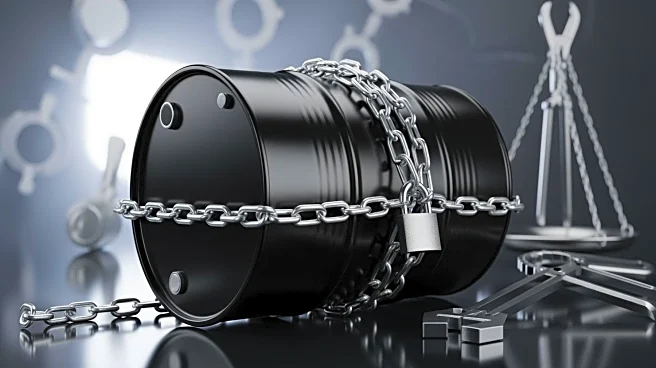What's Happening?
The Group of Seven (G7) industrialized economies, along with the European Union (EU), are intensifying efforts to curb Russian oil and gas revenues, which are being used by Moscow to finance the war in Ukraine. The EU is proposing a maritime declaration
to enhance inspection rights on Russia's 'shadow fleet' of oil tankers. This initiative is part of a broader strategy to enforce sanctions more robustly. The EU's diplomatic arm, the EEAS, has highlighted the need for bilateral agreements between flag states and the EU to facilitate pre-authorized boardings for inspections. The EU is also addressing the issue of fake flag registrations, which are used to circumvent sanctions. The upcoming 19th package of EU sanctions is expected to increase the number of targeted vessels to approximately 560 and advance the ban on Russian liquefied natural gas (LNG) imports to January 1, 2027.
Why It's Important?
The coordinated actions by the G7 and EU signify a significant escalation in efforts to limit Russia's financial resources for its military activities in Ukraine. By targeting the shadow fleet and enhancing inspection capabilities, the EU aims to close loopholes that allow Russia to continue exporting oil despite existing sanctions. This move could have substantial economic implications, potentially reducing Russia's oil revenue and impacting global oil markets. Countries and companies involved in the transportation and purchase of Russian oil may face increased scrutiny and legal challenges. The sanctions could also influence global energy prices and supply chains, affecting industries and consumers worldwide.
What's Next?
The EU foreign ministers are scheduled to meet to discuss the new measures against Russia, including the maritime declaration. The adoption of the 19th package of sanctions is anticipated within the next week. As these measures are implemented, there may be reactions from affected countries and companies, potentially leading to diplomatic tensions or legal disputes. The effectiveness of these sanctions will depend on the cooperation of international partners and the ability to enforce inspection rights on the high seas.
Beyond the Headlines
The focus on Russia's shadow fleet highlights the complexities of enforcing international sanctions in the maritime industry. The use of fake flag registrations and the operation of unregistered vessels pose significant challenges to global regulatory frameworks. This situation underscores the need for international cooperation and the development of more sophisticated tracking and enforcement mechanisms. The long-term impact of these measures could lead to changes in maritime law and increased transparency in the shipping industry.















